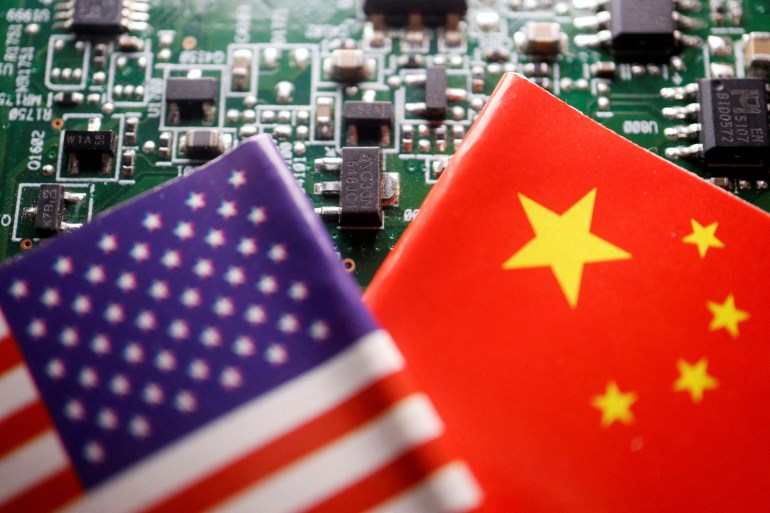Biden issues executive order restricting US investment in Chinese tech | Business and Economy News
President Joe Biden on Wednesday signed an executive order that will narrowly prohibit certain United States investments in sensitive technology in China and require government notification of funding in other tech sectors.
Biden said in a letter to Congress he was declaring a national emergency to deal with the threat of advancement by countries like China “in sensitive technologies and products critical to the military, intelligence, surveillance, or cyber-enabled capabilities”.
The long-awaited order authorises the US treasury secretary to prohibit or restrict certain US investments in Chinese entities in three sectors: semiconductors and microelectronics, quantum information technologies, and certain artificial intelligence systems.
Senior administration officials said that the effort stemmed from national security goals, rather than economic interests and that the categories it covered were narrow in scope. The order seeks to blunt China’s ability to use US investments in its technology companies to upgrade its military while also preserving broader levels of trade that are vital for both nations’ economies.
The US and China appear to be increasingly locked in geopolitical competition, along with their deep trade relationship as the world’s two largest economies. Biden administration officials have insisted that they have no interest in “decoupling” from China. Yet, the US has limited the export of advanced computer chips, sought to limit investments in China and kept the expanded tariffs set up by former President Donald Trump.
The move could fuel tensions between the world’s two largest economies, although US officials insisted the prohibitions were intended to address “the most acute” national security risks and not to separate the two countries’ highly interdependent economies.
Senate Democratic Leader Chuck Schumer praised Biden’s order, saying, “For too long, American money has helped fuel the Chinese military’s rise. Today the United States is taking a strategic first step to ensure American investment does not go to fund Chinese military advancement.” He said Congress must enshrine restrictions in law and refine them.
‘Weapon in the name of national security’

The order is aimed at preventing US capital and expertise from helping develop technologies that could support China’s military modernisation and undermine US national security. It is focused on private equity, venture capital, joint venture and greenfield investments.
Most investments captured by the order will require the government to be notified about them. Some transactions will be prohibited. Treasury said it anticipates exempting “certain transactions, including potentially those in publicly-traded instruments and intracompany transfers from US parents to subsidiaries”.
A spokesperson for the Chinese embassy in Washington, Liu Pengyu, warned on Wednesday that the new limits would “seriously undermine the interests of Chinese and American companies and investors”. He added that China would take steps to “safeguard” its rights.
Previously, on Friday, the embassy said the US “habitually politicises technology and trade issues and uses them as a tool and weapon in the name of national security”.
The regulations will only affect future investments, not existing ones, an administration official told the news agency Reuters.
The Biden administration said it engaged with US allies and partners as it developed the restrictions “and will continue coordinating closely with them to advance these goals.” It added the executive order reflects discussions with the Group of Seven (G7) countries.
It is expected to be implemented next year, a person briefed on the order said, after multiple rounds of public comment, including an initial 45-day comment period.
Regulators plan to issue an advance notice of proposed rulemaking to further define the scope of the programme and a comment period to solicit public feedback before making a formal proposal.
Sources previously told Reuters that investments in semiconductors that will be restricted are expected to track export control rules for China issued by the US Department of Commerce in October.
Emily Benson of the Center for Strategic and International Studies (CSIS), a bipartisan policy research organisation, said she expects investments in artificial intelligence to be prohibited to military users and uses and that other investments in the sector will only require notification to the government.
Benson said the burden will fall on the administration to determine what artificial intelligence (AI) technologies fall into the military category.
“They will have to draw a line of what constitutes a military application of AI, and to define AI,” said Benson, director of CSIS’s project on trade and technology.
The regulations concerning AI are still in development, the person briefed on the order said. The person said the same was also true for quantum computing but that it was expected to prohibit certain sensors and other things related to the technology.
The person added that there could be potential exemptions related to universities and research.




